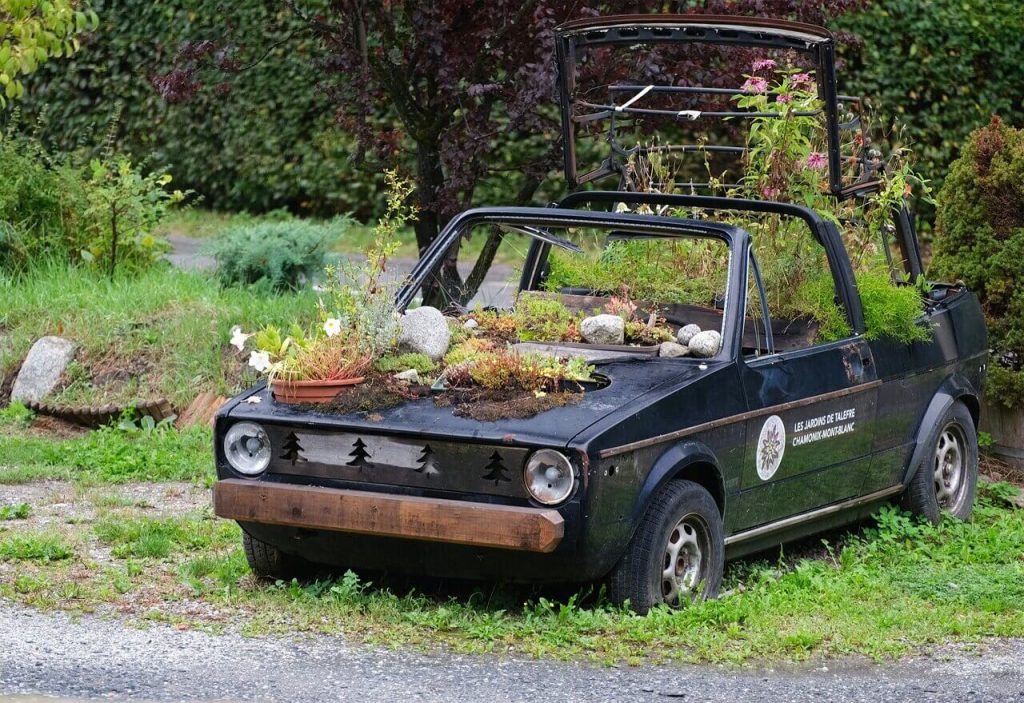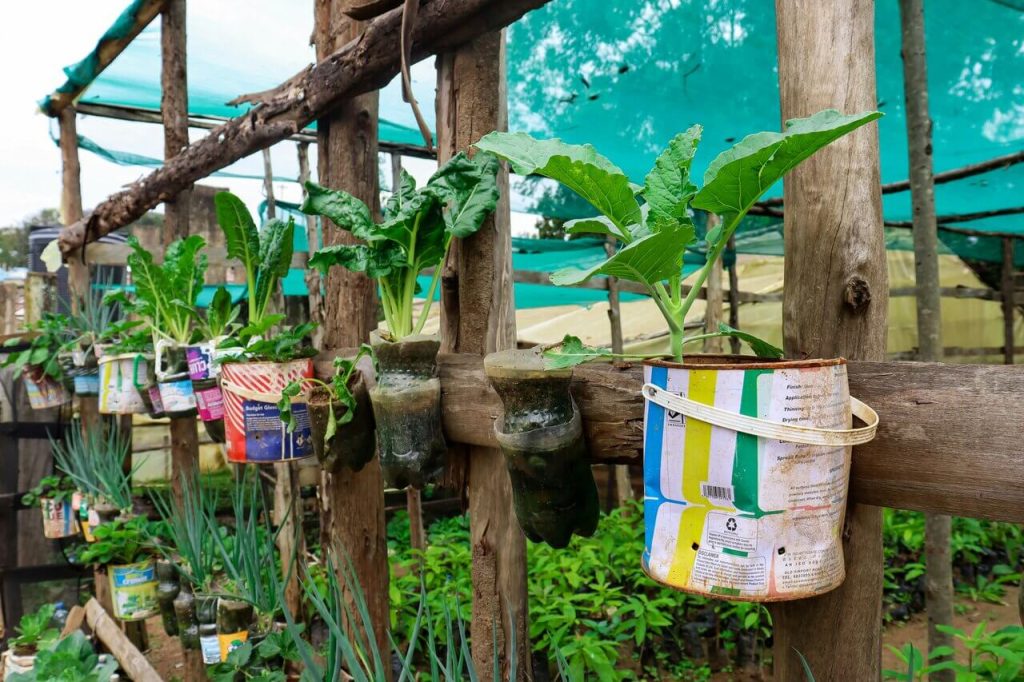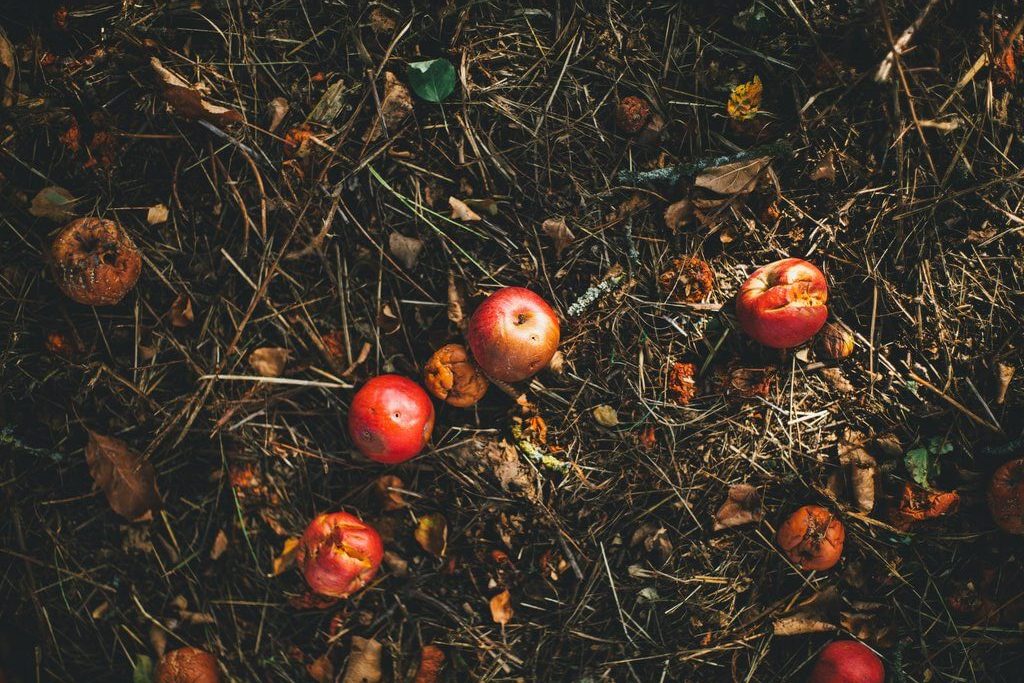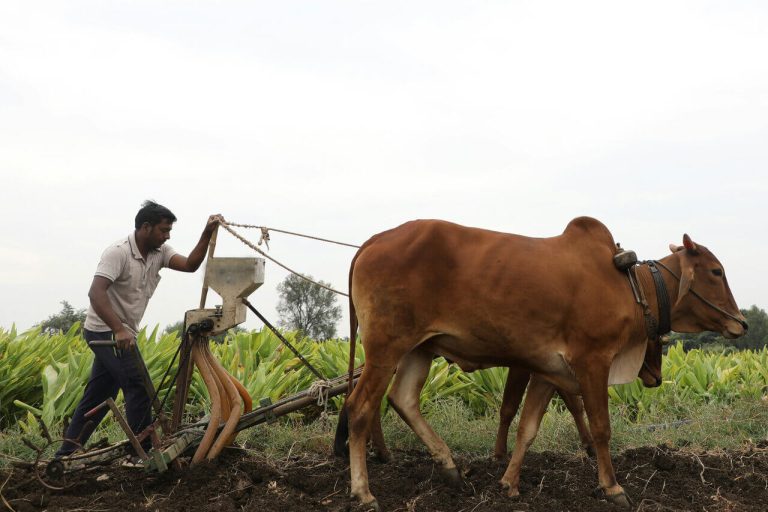100+ Benefits When You Recycle Gardens

March 19th marks Global Recycling Day, but as a gardener, you can benefit from and recycle gardens year-round.
I began making a list of the benefits gained when people recycle gardens. But, the list kept growing and now there’s more than 100 benefits on the list. Each point is beneficial, but combined they represent how recycling changes gardens from pretty spaces to powerhouses of environmental stewardship.
Each concept contributes to the health of our garden ecosystems. And each reminds us how we can preserve the planet for future generations.
The size of your garden does not matter. A garden can be one plant or a giant farm, the principles are the same. The most important aspect and the way to reap them most benefit is to recycle gardens everyday.
Enhance both the health of gardens and the environment when you recycle gardens
Waste Reduction: Recycling garden waste, like leaves and clippings, reduces landfill use and decreases methane emissions from decomposing organic matter.
Soil Health: Composting organic waste improves soil structure, fertility, and aeration, leading to healthier plant growth.
Water Conservation: Using recycled materials for mulching retains soil moisture, reducing the need for frequent watering.
Pest Management: Composting can reduce garden pests by breaking down diseased plant material safely, decreasing the need for chemical pesticides.
Cost Savings: Recycling and composting garden waste saves money on soil conditioners, fertilizers, and mulching materials.
Resource Efficiency: Recycling non-organic materials, like pots and tools, reduces the need for new resources and supports sustainable gardening practices.
Biodiversity Support: Using compost improves soil health, which in turn supports a wider range of plant and animal life within the garden ecosystem.
Education and Community Building: Sharing recycled materials and composting tips can foster community among gardeners and educate others on sustainable practices.
Reduction in Chemical Use: Healthy, compost-enriched soil reduces the need for chemical fertilizers, promoting a more organic approach to gardening.
Climate Change Mitigation: By composting and recycling, gardeners help reduce greenhouse gas emissions, contributing to global efforts against climate change.
Recycling emphasizes sustainability, efficiency, and ecological balance
Extended Plant Life: Recycling containers and pots for new plantings extends their life, reducing plastic waste and saving resources.
Enhanced Plant Nutrition: Homemade compost from kitchen scraps provides plants with rich, natural nutrients, promoting healthier growth without synthetic additives.
Creative Garden Features: Recycled items can be transformed into unique garden features, like bird baths, planters, and decorative elements, adding character and reducing waste.
Pollution Reduction: By recycling and composting, gardeners contribute to lessening overall pollution, leading to cleaner air and water in their communities.
Erosion Control: Using recycled organic material as ground cover can prevent soil erosion, preserving land and water quality.
Energy Savings: Recycling requires less energy compared to producing new products from raw materials, contributing to overall energy conservation.
Wildlife Habitats: Certain recycled materials can be used to create habitats for beneficial wildlife, promoting biodiversity and ecological balance in the garden.
Reduced Greenhouse Gas Emissions: Composting organic waste reduces methane emissions from landfills, contributing to climate change mitigation.
Sustainable Water Practices: Recycled containers can be repurposed for rainwater harvesting, supporting sustainable water usage and conservation.
Promotion of Local Ecosystems: Using local recycled materials for garden amendments encourages the cultivation of native plants, supporting local wildlife and reducing the garden’s ecological footprint.
Integrate and recycle gardens to underscore versatility and environmental impact
Improved Soil Microbiology: Recycling organic matter into compost introduces beneficial microorganisms into the soil, enhancing nutrient cycling and soil health.
Minimization of Weed Growth: Using recycled organic material as mulch can suppress weed growth, reducing the need for herbicidal interventions and laborious weeding.
Conservation of Natural Resources: Recycling reduces the demand for new resources, conserving minerals, forests, and other natural habitats potentially affected by extraction processes.
Increased Carbon Sequestration: Healthy, organically rich soils cultivated with compost can store more carbon, mitigating the impacts of carbon dioxide on climate change.
Reduction of Water Pollution: Properly composting garden and household organic waste prevents the leaching of nutrients into water bodies, reducing eutrophication and protecting aquatic ecosystems.
Encouragement of Sustainable Living Practices: Gardeners who recycle and compost set a positive example for sustainable living, encouraging others in their communities to adopt similar practices.
Economic Benefits for Communities: Participating in community recycling programs can generate revenue and create jobs in recycling and composting industries, benefiting local economies.
Reduction of Pesticide Use: Healthy soils produce strong plants more resistant to pests and diseases, reducing the need for chemical pesticides.
Enhancement of Garden Aesthetics: Recycled materials can be creatively used in garden design, contributing to aesthetic appeal and personal satisfaction.
Support for Circular Economy: By recycling and reusing materials, gardeners contribute to a circular economy, where waste is minimized and materials are kept in use, fostering a more sustainable economic model.
Recycling enhances garden sustainability, productivity, and ecological health

Resourceful Water Use: Creating irrigation systems from recycled materials, like old hoses or containers, promotes efficient water use and conservation.
Climate Adaptation: Utilizing recycled materials for garden modifications can helpgardensbetter adapt to changing climates, such as through increased shade or water retention features.
Disease Prevention: Composting at proper temperatures can kill off plant pathogens and unwanted seeds, leading to healthier gardens with less disease and fewer invasive species.
Support of Urban Gardening: Recycling enables urban gardeners to make the most of limited space through vertical gardens and container gardening, utilizing repurposed materials.
Promotion of Soil Diversity: Adding compost made from a variety of recycled organic materials can increase the diversity of soil life, leading to more robust plant growth.
Reduction in Noise Pollution: Strategically placed garden features made from recycled materials, such as walls or barriers, can reduce noise pollution from surrounding areas.
Energy Conservation in Gardening Practices: Using hand tools made from recycled materials or repurposing items to reduce the need for electric or gas-powered tools saves energy.
Enhanced Learning Opportunities: The process of recycling and composting offers educational opportunities for gardeners of all ages to learn about ecology, soil science, and sustainable practices.
Fostering Community Engagement: Projects involving recycling and garden creation can bring communities together, promoting social cohesion and shared environmental goals.
Contribution to Global Sustainability Goals: Through recycling, gardeners contribute to global sustainability efforts, such as waste reduction, conservation of resources, and reduction of greenhouse gas emissions, aligning their gardening practices with broader environmental objectives.
Innovative and environmentally conscious approaches gardeners can adopt when you recycle gardens
Nutrient Cycling Enhancement: Recycling organic garden waste back into the garden helps maintain essential nutrient cycles, reducing dependency on synthetic fertilizers.
Protection Against Extreme Weather: Using recycled materials to create protective structures for plants can shield them from extreme weather conditions, like frost, heavy rain, or intense sun.
Optimization of Growing Conditions: Repurposed items can be used to create microclimates or specialized growing conditions within the garden, such as cold frames made from recycled windows.
Promotion of Pollinators: Recycled materials can be crafted into pollinator-friendly structures like bee hotels or butterfly feeders, promoting biodiversity.
Sustainability Education: Implementing and demonstrating recycling practices in gardening serves as a practical education tool for sustainability, teaching the importance of resource conservation.
Improvement in Physical and Mental Health: The act of recycling and engaging with the garden promotes physical activity and mental well-being, connecting individuals with nature and providing a sense of accomplishment.
Reduction of Carbon Footprint: By reducing the need for new materials and minimizing waste, recycling in the garden helps lower the gardener’s overall carbon footprint.
Innovative Use of Space: Recycling allows for the -creative use of vertical spaces and unconventional areas for gardening, utilizing repurposed materials for planters and supports.
Enhanced Garden Productivity: Healthy, nutrient-rich soil resulting from composting and mulching with recycled materials can lead to more productive vegetable and fruit gardens.
Long-Term Environmental Impact: Through the cumulative effects of reduced waste, conservation of resources, and habitat creation, recycling in gardening contributes to long-term environmental health and sustainability.
Inventive and ecologically beneficial aspects of integrating recycling practices into gardening
Heritage Plant Preservation: Recycling heirloom seeds and sharing them within gardening communities helps preserve plant varieties that may be rare or diminishing, ensuring biodiversity and genetic heritage.
Carbon Banking: By composting and improving soil organic matter, gardens act as carbon sinks, banking carbon that would otherwise contribute to greenhouse gas emissions.
Thermal Insulation for Plants: Utilizing recycled materials to create insulation around plant beds can protect sensitive plants from temperature fluctuations, enhancing survival rates during off-season periods.
Eco-friendly Pest Control: Recycled materials can be used to create barriers or traps for pests, reducing the reliance on harmful chemical pest control methods and promoting a healthier ecosystem.
Renewable Resource Utilization: By focusing on recycling, gardeners prioritize the use of renewable over finite resources, aligning with sustainable living principles and reducing environmental strain.
Cultivation of Native Plants: Recycling native plants through propagation and sharing cuttings supports local ecosystems and wildlife, contributing to the conservation of native flora and fauna.
Enhanced Soil Water Retention: The use of recycled organic material in soil amendment increases its water-holding capacity, making gardens more drought-resistant and reducing water usage.
Social Responsibility: Participating in recycling and sustainable gardening practices demonstrates a commitment to environmental stewardship and social responsibility, inspiring others to adopt similar practices.
Reduction of Urban Heat Island Effect: In urban areas, gardens utilizing recycled materials for green spaces can help reduce the urban heat island effect, contributing to cooler and more pleasant living environments.
Creation of Educational Spaces: Gardens that incorporate recycled materials and sustainable practices serve as living laboratories for education on ecology, sustainability, and environmental science, benefiting schools and communities.
Innovative and less common benefits when you recycle gardens

Heat Island Mitigation: Gardens using recycled materials for green roofs or shading can help reduce urban heat islands, lowering local temperatures.
Wildlife Corridors: Creating garden features from recycled materials can facilitate wildlife movement, offering safe passages and habitats within urban landscapes.
Genetic Diversity Preservation: Using recycled containers for seed swapping and plant sharing among gardeners can aid in the preservation and dissemination of rare or heirloom plant varieties.
Soil Erosion Control: Employing recycled materials as barriers or to create terraces in sloped gardens can significantly reduce soil erosion, preserving topsoil and preventing sediment runoff into waterways.
Carbon Banking: Large-scale composting of organic garden waste contributes to carbon banking, where carbon is stored in the soil rather than released into the atmosphere, aiding in climate change mitigation.
Sustainable Drainage Systems: Recycled materials can be incorporated into sustainable drainage systems (SuDS) within gardens, improving water quality and reducing runoff.
Biochar Production: Garden waste can be recycled into biochar, a form of charcoal used to enhance soil properties, sequester carbon, and improve water retention.
Permaculture Practices: Recycling is a core principle in permaculture, promoting the reuse of materials in garden design and maintenance to create sustainable and self-sufficient ecosystems.
Reduction of Light Pollution: Using recycled materials to construct garden elements that shield outdoor lighting can help reduce light pollution, benefiting nocturnal wildlife and reducing energy consumption.
Cultural and Historical Preservation: Repurposing historical or culturally significant materials in garden designs can preserve heritage while contributing to unique and meaningful landscapes.
Innovation enriches gardens and their surrounding environments
Microhabitat Creation: Using varied recycled materials in garden layouts can create diverse microhabitats, each supporting different types of wildlife and plant species, enhancing biodiversity.
Educational Spaces: Gardens that incorporate recycled materials can serve as dynamic, interactive educational spaces for schools and communities, demonstrating sustainable practices and ecological cycles firsthand.
Enhanced Aesthetic Appeal: Creative reuse of recycled items can add unique, artistic elements to garden designs, turning recycled art into conversation pieces while reducing waste.
Improvement of Air Quality: Plants grown in enriched, recycled-compost soils can contribute more effectively to air purification, absorbing more carbon dioxide and releasing oxygen.
Noise Reduction: Strategically placed gardens using recycled materials for dense planting or barriers can act as natural sound buffers, reducing urban noise pollution.
Sustainable Pest Management: Recycling organic waste into compost and using it in gardens can promote a healthy balance of microorganisms, which can naturally suppress pathogen growth and reduce pest outbreaks.
Restoration of Degraded Soils: The application of compost made from recycled organic matter can restore life and fertility to degraded or contaminated soils, making them productive again.
Water Quality Improvement: By absorbing rainwater and reducing runoff, gardens utilizing recycled materials for soil enhancement and mulching can help improve local water quality.
Reduction in Manufacturing Demands: By repurposing and recycling materials for garden use, the demand for newly manufactured garden products and the resources and energy needed for their production are reduced.
Support for Local Economies: Engaging in recycling and composting initiatives can support local businesses and sustainability programs, promoting a community’s economic and environmental well-being.
Interconnectedness of sustainable recycling practices
Water Conservation Efforts: Utilizing recycled materials for constructing rain gardens or xeriscaping can significantly conserve water by creating landscapes that require minimal irrigation.
Urban Cooling: Gardens that incorporate recycled materials in their infrastructure can contribute to urban cooling by providing shade and evaporative cooling, thus reducing the need for air conditioning in surrounding areas.
Pollinator Pathways: By using recycled items to create gardens rich in native flowering plants, gardeners can contribute to the creation of pollinator pathways, essential for the survival of bees, butterflies, and other pollinators.
Socio-economic Inclusivity: Recycling in gardening makes it more accessible to individuals and communities with limited resources, promoting inclusivity in green spaces and gardening benefits.
Enhanced Soil Water Retention: Compost made from recycled organic matter can improve soil structure, enhancing its ability to retain water and reducing the need for supplemental irrigation.
Local Biodiversity Enhancement: The use of recycled materials to support habitat-friendly gardening practices can enhance local biodiversity, supporting a range of flora and fauna indigenous to the area.
Community Well-being and Cohesion: Community projects focused on recycling and gardening can enhance social cohesion, provide a sense of purpose, and improve overall community well-being.
Reduction of Heat Stress on Plants: Mulching with recycled organic materials can help reduce soil temperature, minimizing heat stress on plants during hot weather periods and leading to healthier garden ecosystems.
Resource Lifecycle Extension: Repurposing and recycling garden and household items extend their lifecycle, reducing the overall environmental impact associated with disposal and new production.
Climate Resilience: Through practices such as composting and using recycled materials, gardens can become more resilient to climate change impacts, such as extreme weather events, by improving soil health, water retention, and biodiversity.
Additional nuances when you recycle gardens
Pollination Enhancement: Gardens that use recycled materials to create diverse plant habitats can attract a wider variety of pollinators, crucial for the reproduction of many plants and the health of ecosystems.
Resource Sharing Networks: Recycling initiatives can foster networks for sharing resources among gardeners, such as tool libraries or materials exchanges, promoting a culture of sustainability and community support.
Local Climate Regulation: The strategic use of recycled materials in urban gardening can contribute to local climate regulation, mitigating the urban heat island effect through increased greenery.
Social Well-being: Community gardens utilizing recycled materials can become focal points for social interaction, improving community health and cohesion.
Reduction of Fire Hazards: Proper recycling and composting of garden waste reduce potential fire hazards in and around residential areas, contributing to safer communities.
Promotion of Native Species: Using recycled materials to support the growth of native plant species can enhance local ecosystems, providing appropriate food and shelter for native wildlife.
Innovation in Garden Design: The challenge of incorporating recycled materials can inspire innovative garden designs, pushing the boundaries of traditional landscaping.
Heritage Conservation: Recycling historical artifacts or materials in garden settings can contribute to the conservation of cultural heritage, integrating stories of the past into living landscapes.
Enhanced Soil Moisture Retention: Compost made from recycled organic matter can significantly improve soil moisture retention, reducing the need for supplemental watering and conserving water resources.
Role of sustainable practices
Increased Self-Sufficiency: By recycling and reusing materials within the garden, gardeners can increase their self-sufficiency, reducing reliance on commercial products and fostering a deeper connection to their environment.
Encouragement of Non-Monoculture Practices: By repurposing recycled materials to create diverse planting environments, gardeners are encouraged to move away from monoculture, fostering a garden ecosystem that supports a wider range of species.
Improvement in Water Management Techniques: Utilizing recycled materials for creating innovative irrigation systems or rain gardens can lead to more effective water management, reducing waste and promoting conservation.
Conservation of Endangered Plant Species: Gardens can use recycled materials to create specialized habitats for growing and preserving endangered plant species, contributing to biodiversity conservation efforts.
Reduction in the Use of Plastic: By finding new uses for recycled materials in the garden, the reliance on new plastic products, which contribute to pollution and are derived from non-renewable resources, can be significantly reduced.
Promotion of Zero-Waste Practices: Encouraging the use of all organic waste in composting efforts supports the principle of zero waste, aiming for the complete reuse and recycling of materials.
Support for Wildlife Rehabilitation: Gardens designed with recycled materials can include features that support wildlife rehabilitation, such as shelters for injured animals or safe havens for pollinators and beneficial insects.
Enhancement of Urban Spaces: Recycling in urban gardening projects can transform underutilized or neglected urban spaces into vibrant, green areas, improving the quality of life for city residents.
Fostering of Eco-friendly Consumer Habits: The practice of recycling in gardening can encourage gardeners and those around them to adopt more eco-friendly habits in other aspects of their lives, promoting a more sustainable lifestyle overall.
Creation of Educational Materials: Gardens that incorporate recycling can serve as living laboratories, providing valuable educational materials for schools, community groups, and online platforms, spreading knowledge about sustainability.
Strengthening of Food Security: By using recycled materials to grow food in community gardens, urban areas can strengthen their food security, providing fresh, locally sourced produce to residents.
The bottom line of why to recycle gardens
Opening ourselves to the multitude of benefits when we recycle gardens creates sustainability. It directly correlates to saving money and saves the cost of labor.
When we repurpose materials we reduce waste, conserve natural resources, and create healthier, more resilient garden ecosystems. This improves soil quality, promotes biodiversity, and supports local wildlife. This happens at the same time we, as gardeners, reduce our carbon footprint.
Recycling encourages innovation and creativity in garden design. It strengthens community bonds through shared resources and heightens awareness of environmental stewardship.
In essence, by integrating recycling into our gardening practices, we find ourselves on a holistic path toward achieving a more sustainable interaction with our environment. And this demonstrates that small, thoughtful actions can lead to impactful environmental benefits.






